The Teaching Assistant’s Handbook for Level 2, written by Teena Kamen, is a 2010 publication supporting the development and learning of students. The book is suitable for students studying the following teaching assistant courses and qualifications:
- Level 2 Award in Support Work in Schools
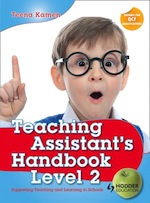
- Level 2 Certificate in Supporting Teaching and Learning in Schools
- Level 2 Certificate in Supporting the Wider Curriculum in Schools
The book is divided into 14 chapters (the first 6 are detailed below):
1 Supporting child and young person development
A guide for the QCF unit ‘Child and Young Person Development’.This chapter focuses on the importance of observation relating to child behaviour, skills, development sequence and activity planning based on individual needs. Teaching assistants will routinely be making observations and various principles need to be taken into consideration (such as objectiveness and confidentiality). Observation best practise methods are discussed and examples given with suggested formats. Suggested activities are given to help emphasise the importance of observation and how developmental progress is on an individual basis. Planning activities based on individual student’s progress is discussed and the formats a teaching assistant can use to prepare, review and evaluate. A detailed sequence of children’s development is provided from 0 to 16 years, divided into subsections of development:
- Social – the way in which children’s social development can be supported are discussed, including behavioural patterns and self awareness.
- Physical – gross motor skills and fine motor skills
- Intellectual – how information is stored and recalled
- Communication & Language – shared language, relating to others and expressing feelings
- Emotional – focus on personality and temperament
Recognising and supporting children’s transitions are noted for age groups i.e. age 3 to 11 years will require reassurance and explanations or age 11 to 16 will require open days/evenings and career advice when going through transitions.
2 Safeguarding the welfare of children and young people
A guide for the QCF unit ‘Safeguarding the welfare of children and young
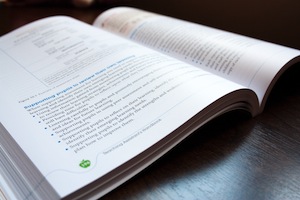
people’ This chapter details the importance of health and safety (a legal understanding is required to ensure the the safety of the teaching assistant and pupil). For example, tools or other equipment will need to be maintained and accidents/injuries will need to be logged. Common childhood illnesses are detailed – the symptoms and how to deal with each illness. Identifying abuse in the following forms:
- Physical
- Emotional
- Sexual
- Neglect
This chapter also discussed the law regarding safeguarding children according to the Children Act 1989 and Children Act 2004. The referral process is explained and how teaching assistants can identify signs of abuse. Helping pupils to protect themselves against abuse or being bullied is also detailed.
3 Maintaining and supporting professional relationships
A guide for the QCF unit ‘Communication and professional relationships with children, young people and adults’ and ‘Maintain and support relationships with children and young people’. This chapter details the importance of creating positive, professional relationships with pupils and the types of positive interactions. Communicating in a positive and clear manner is essential, so notes are provided on how best to communicate, including how to actively listen. The importance of praise, encouragement and support is highlighted, along with ways in which behavioural problems are tackled i.e. meeting the standards of the school. A common problem tackled by many teaching assistants is the emotional outburst, which this chapter covers and details the way these outbursts should be handled. Helping pupils deal with conflicts such as jealousy or disagreements is noted and examples given. Good communication with adults is essential as teaching assistants will be regularly reporting back to colleagues, carers and parents. Best practise for confidentiality and the Data Protection Act 1998 are detailed.
4 Supporting equality, diversity and inclusion
A guide for the QCF unit ‘Equality, diversity and inclusion in work with children and young people’. This chapter details the rights and needs of children and how these rights have changed over the years to now include rights to express views and engage in play. The United Nations Convention on the Rights of the Child are detailed along with legislation. Cultural diversity, disabilities and gender are discussed with regards to promoting a positive attitude and the ways teaching assistants should approach these issues.
5 Understanding schools as organisations
A guide for QCF unit ‘Schools as organisations’. This chapter details the UK education system and how it works, from pre-school to further education. Alongside this is the description of the school workforce and the roles/responsibilities. The teaching assistant role is covered in detail regarding the role and how it supports those within the workforce and the pupils. Examples of job descriptions are included and also the procedures for grievances and staff code of conduct.
6 Supporting children and young people’s health and safety
A guide for QCF unit ‘Support children and young people’s health and safety’. This chapter covers the maintenance of health and safety during learning – i.e. how risk assessments are carried out and how equipment must be stored (an example of a risk assessment form is shown). Play areas are required to be safe and clean so tips on how to maintain play areas are given. School evacuations and procedures for missing pupils are also documented, along with procedures for accidents (administering first aid and completing accident/injury forms).

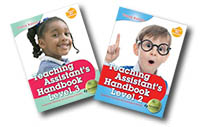 To coincide with UNISON’s celebratory day for teaching assistants on 29th November 2013, we’re offering TWO winners the chance to win QCF teaching assistant study books. Hodder Education have generously provided Teaching Assistant’s Handbook for Level 2 and Teaching Assistant’s Handbook for Level 3, worth £22.99 each, for each lucky winner.
To coincide with UNISON’s celebratory day for teaching assistants on 29th November 2013, we’re offering TWO winners the chance to win QCF teaching assistant study books. Hodder Education have generously provided Teaching Assistant’s Handbook for Level 2 and Teaching Assistant’s Handbook for Level 3, worth £22.99 each, for each lucky winner.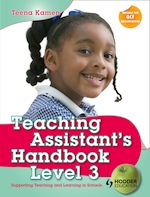

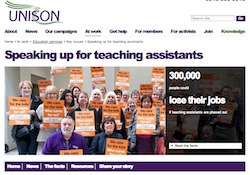 A date for your diary – 29th November 2013. This is the date UNISON, one of the largest education unions, has set aside for the celebration of teaching assistants. Although the Department of Education have specified teaching assistants will not be phased out (
A date for your diary – 29th November 2013. This is the date UNISON, one of the largest education unions, has set aside for the celebration of teaching assistants. Although the Department of Education have specified teaching assistants will not be phased out (
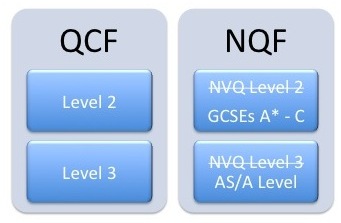
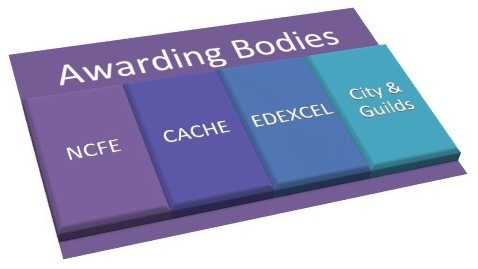
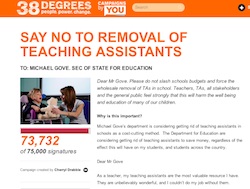 After the news of the Government culling teaching assistants across the UK, petitions were started to encourage parents, teachers, other teaching assistants and, well, everyone to sign up and fight against the decision. Cherryl Drabble, a teacher, who set up the ‘SAY NO TO REMOVAL OF TEACHING ASSISTANTS’ petition would really like as many numbers as possible. Therefore, please visit her petition and sign. If you wish to spread the word, she has put together the following email to use:
After the news of the Government culling teaching assistants across the UK, petitions were started to encourage parents, teachers, other teaching assistants and, well, everyone to sign up and fight against the decision. Cherryl Drabble, a teacher, who set up the ‘SAY NO TO REMOVAL OF TEACHING ASSISTANTS’ petition would really like as many numbers as possible. Therefore, please visit her petition and sign. If you wish to spread the word, she has put together the following email to use: